The Summer 2024 Anime Preview Guide
TASUKETSU -Fate of the Majority-
How would you rate episode 1 of
TASUKETSU -Fate of the Majority- ?
Community score: 3.1
What is this?
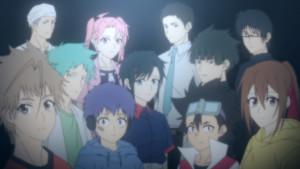
Suddenly, the game begins. "Tasūketsu" is a harsh survival game where the majority of players will lose. To confront the game's powerful mastermind, The Emperor, male and female players will carve out their own destiny using their mysterious special powers, known as "Privileges."
TASUKETSU -Fate of the Majority- is based on a manga of the same name by Taiga Miyakawa. The anime series is streaming on Crunchyroll on Tuesdays.
How was the first episode?
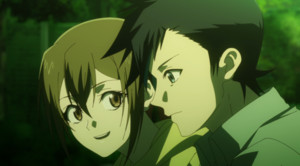
Rating:
To be honest, I'm kind of struggling with Tasūketsu. I think it could be great in an interactive medium. The somewhat convoluted rules of the game the characters are pulled into–a death game where people can submit questions with just two answers via a blue laptop or red postbox. At midnight, the side with the majority dies. However, players can find privileges and other tools to help them with the game. At the end, when just one player remains, they will get to meet the Emperor, the mastermind behind everything. It sounds like a game written by Kōtarō Uchikoshi of Zero Escape fame, and I would play the heck out of it.
As a non-interactive anime, though? That's considerably more hit-or-miss, and Tasūketsu wavers wildly between “hit” and “miss.” There's a lot of information dumped in this first episode, and there are a lot of mysteries that are still unanswered, some of which are explicitly pointed out. Like, what happens if their numbers are split evenly? Unfortunately, it's hard at times to distinguish whether characters are acting based on information the audience doesn't yet have, or if they're just making wild choices for the sake of drama.
The clunky character writing does little to clear up that confusion. Saneatsu, the ostensible protagonist, ends up pulling aside Saaya, a fellow survivor, to tell her about his plan to make it to the end and kill the Emperor. It just doesn't land because we barely know either of them as characters. Who were they and what were their lives like before? Did their paths cross at school at all? What motivates them? All we really knew about Saneatsu before this was that he didn't like computers, and we knew even less about Saaya. Suddenly, we're watching the two of them get blushy over calling each other by their given names and supposed to find it… endearing? A few minutes later, we get one of the most confusingly directed action sequences I've ever seen, startling from an industry veteran like Tatsuo Satō.
With a series like Tasūketsu, it's hard to suss out the intentional from the incompetent. I'm not sure I want to invest my time in something that could turn out to be a complete bust while I try to figure out if a script inconsistency is a deliberate clue or just bad writing. One thing I'm sure of, though: acting like the question “male or female” only has two answers? Now that's unrealistic.
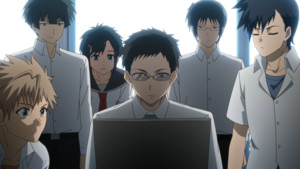
Rating:
As I was watching this first episode of Tasūketsu, I was writing down a list of questions and things that didn't make sense. Here are some examples:
• “Why do they have water and power but not gas?”
• “Why do they have radio and not TV or internet?”
• “Why are none of the kids crying at the fact that all their friends and family are dead?”
• “Why is it that the kids haven't run into a single other person? (Even if only 13 million of the 14 million living in Tokyo are dead, you'd still run into people.)”
At first, I chalked all these things up to bad writing. After all—while there are a few, well-realized death game anime out there—most are derivative at best. All these creative choices in this anime seemed like they were either A) made to add a sense of surreality or B) were contrived writing to shoehorn the setting into one where the story could actually happen in the way the author wanted it to.
However, as the episode went on, Saneatsu himself brought up all the same questions I had thought of and even a few additional ones. He and Saaya wondered if all these things might be hints of some sort, the key to figuring out what's really going on. Suddenly, I was left with a new question: “Is this show smarter than I am giving it credit for?” The truth is, I have no way of knowing, and likely couldn't make such a judgment until I'd watched many more episodes.
But then there's the issue that the true result of Saneatsu and Saaya's conversation is the knowledge that nothing can be trusted—like, literally nothing. You can't trust other people. You can't trust the words of the god-like game master. You can't even trust the rules of reality. While interesting in concept, this raises one major problem. If nothing can be trusted, then where is the tension? Sure, anyone can die at any moment but what's to say they can't come back at any moment as well.
Beyond this, the game rules being so ill-defined is a huge hindrance. The core of any game anime (be that a death game anime like Future Diary or a normal game anime like Kakegurui) is to watch the characters out-think each other and exploit the rules to achieve what seems to be an impossible victory. You can't do that if the rules are unclear.
Add onto this bland characters that lack even one-note personalities and even the apparent protagonist shift at the end of the first episode doesn't seem like it will be enough to save this one. However, the show does seem to be self-aware gives me a bit of hope for this series, though I don't care enough to keep watching.
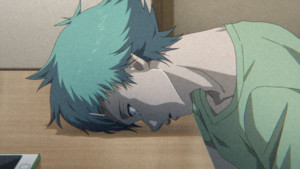
Rating:
Tasūketsu is the kind of show that feels like it should exist inside of another show. You know how there will sometimes be those running shows within a story universe that will constantly pop up in the background on TVs during conversations and whatnot? Think Invitation to Love from Twin Peaks, or Inspector Spacetime from Community. You'll get a vague sense for the general premise, the characters, and so on; there might even be cute little moments where what is happening on screen is meant to parallel the action in the main story. You'll only ever get to see random scraps of context-free scenes of the thing because it's not supposed to function like a real show. It's too sleight to even be considered a full spoof or satire, really. It's just meant to evoke the general idea of a show. Purely functional, and nothing more.
Anyway, Tasūketsu feels like if someone took all of the scraps from one of those fake shows- within-a-show and decided to make it into a complete series for some reason. On the surface, it is just another death game anime, but it is so utterly lacking in personality and depth that it can only barely be said to function as a proper TV series. We have a cast of characters that have been unwittingly tossed into the death game, yes, but Tasūketsu goes out of its way to avoid giving any of them any recognizable personality traits or conflicts whatsoever. Our main character, Saneatsu, exists purely to be dragged from scene to scene so that the story is able to go through the motions of its plot. Saaya has seemingly been handed the role of the supporting heroine because she…is a girl? The funniest bit is how the show takes the class president and establishes him as the stoic and coolheaded leader, killing him off-screen thirty seconds after he gets introduced.
Then there's the death game itself, which follows in the lead of the shows characters by existing without ever offering a compelling reason for its existence. It's the usual combination of the frustratingly vague and impossibly omniscient being who randomly shows up and starts killing millions upon millions of people based on the completely arbitrary criteria of its YES/NO parameters and silly scavenger hunt challenges. Also, apparently, the consequences of failure are the victims just falling over dead as if everyone in Japan is actually a mediocre robotic simulacrum of a person and these poor mooks just suddenly ran out of battery charge. Half of the fun of death game anime, even the trashiest of the trash, is seeing how crazy and creative the deaths can be. Are we really in for a season of people just falling over unceremoniously until a winner is declared?
Honestly, Tasūketsu's premiere is so bafflingly threadbare that I have to believe there is something more going on, if only because it hurts me to consider that the creatives involved in making this thing could be so satisfied with a product that feels this unfinished. The "twist" of who ends up being the victim at the end of the episode could well be hinting at a more surprising and creative turn in events for future episodes. Unfortunately, you only get one chance to make a first impression, and Tasūketsu has not convinced me that I need to come back next week to see what's in store.
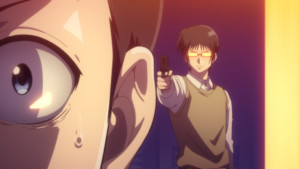
Rating:
I'm actually kind of impressed by this premiere. It's not good; quite the opposite. Yet, in its sheer ineptitude, it seems determined to destroy any remaining dignity that existed for this style of Death/Survival game anime. In the span of 20 minutes, it manages to speedrun through about 15 different "shocking" twists, each one growing more incoherent than the last, until you're looking at a true storytelling train wreck. Yet all that insanity is presented with such poor visuals and bland direction that it never rises to the level of "so bad it's good." It's practically the nadir of death games as a genre.
For one, this whole setup is totally played out. For every genuinely engaging show about an assortment of anime characters being whittled down by a mysterious mastermind's twisted games, you get ten that are total garbage, not even the fun kind of garbage. It's so played out that Tatsuketsu misguidedly tries to jump out in front of its most obvious plot points. Our generic protagonist immediately figures out a half-dozen contradictions or twists within the "Absent Majority" game set up by this mysterious emperor, long before they actually mean anything. Before we can even learn half the cast's names, one of them is running around with a gun trying to kill everyone for no good reason. At least three characters are immediately revealed to have some supernatural power or hidden secret connecting them to this game. These are twists that have worked in other stories of this kind, but Tasūketsu has neither the patience nor savvy to know how to deploy them. So we're left with a bunch of characters we don't know or care about, and then, like, four of them are dead before the credits, so we have even less reason to care.
That total dearth of character is really the death knell for this thing. The most memorable of these shows have vibrant designs and distinct personalities that let you get attached to or root against a particular player. Here, we have a series of background characters from a mid-2000s kids anime, rendered with about as much fidelity, who rocket between plot points and set pieces with dull eyes and slack jaws. What few attempts at sentiment it makes, like two characters wishing they'd gotten a group picture with everyone, fall flat because these characters have known eachother for about two days and have shared about as many conversations. Every single person here feels like an expendable nobody waiting to die, so the "shocking" conclusion to this episode lands with a wet thud – literally.
It's just not good, on any level. Even in a subgenre built on schlock, you've got to have standards, and Tasūketsu uniformly slides under that low bar like a limbo master. It's cheap, boring, and mortifying in its total incompetence.
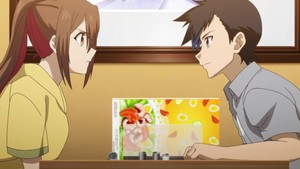
Rating:
I am being more generous with this one than I perhaps feel for one very specific reason: the jump scare of Saneatsu arriving at his friend's house to find him dead actually worked on me, and I found the set up that everyone in the cast woke up to discover that their families died in the night tapped into a very specific fear of mine. (I blame a terrifying commercial I saw when I was little about the dangers of not having a carbon monoxide detector in the home.) Does that excuse the rest of the episode's jumpy storytelling and awkward animation? Not at all, but kudos to the show for that one very effective (on me) scene.
Regrettably, the rest of this isn't great. I'm always a bit leery when an opening theme needs to flash cast names and stats at us because that indicates a very large, unwieldy group. I suspect that Saneatsu's apparent demise at the end is a red herring, and I wouldn't be shocked if it turned out that the "privilege" envelope he and Saaya found allows her to bring all of her dead male companions back to life – or at least Saneatsu himself. The episode seems to delight in tortured rules and ridiculous death game conventions that do the opposite of what they're supposed to: instead of ramping up the tension, they make everything feel overdone and take away the intrigue we're supposed to be feeling. Yes, the false simplicity of the "majority dies" rule is meant to conjure up images of children's games, but by the time we hit the first user-submitted question of "male or female," it just feels silly. Plus, at this point, that's not really an either/or answer, although I know that not everywhere (or everyone) is in agreement about gender identity.
Then there's the fact that this feels very disjointed. Things happen more or less in order, but there's the distinct sense that we're skipping over scenes to hit the setup's highlights (or what someone thinks are the highlights). Why did Saneatsu pick Saaya to confide in and not his pal Kazuhiko? If his goal was really "natural leader," then why not the teacher? Was it really more important for us to get everyone's names and grades instead of doing something with the mystery or horror aspects of the story? Choices are made, and they don't always feel like the natural ones. I also wonder at the decision to take away the dead bodies. I presume that it's to make it look like the emperor has minions or complete control over absolutely everything, but again, it's a weird choice in terms of the genre – leaving the corpses would be much more upsetting and would serve to remind the players of what's at stake.
I can't help but feel that this is squandering its premise. That could change, especially if the cast is pared down and grows closer, but between the ugly character designs and the awkward story beats, it's not working as well as it should. If the manga comes out in English, I'll read it out of curiosity, but I'm not interested in continuing to watch.
discuss this in the forum (145 posts) |
this article has been modified since it was originally posted; see change history
back to The Summer 2024 Anime Preview Guide
Season Preview Guide homepage / archives